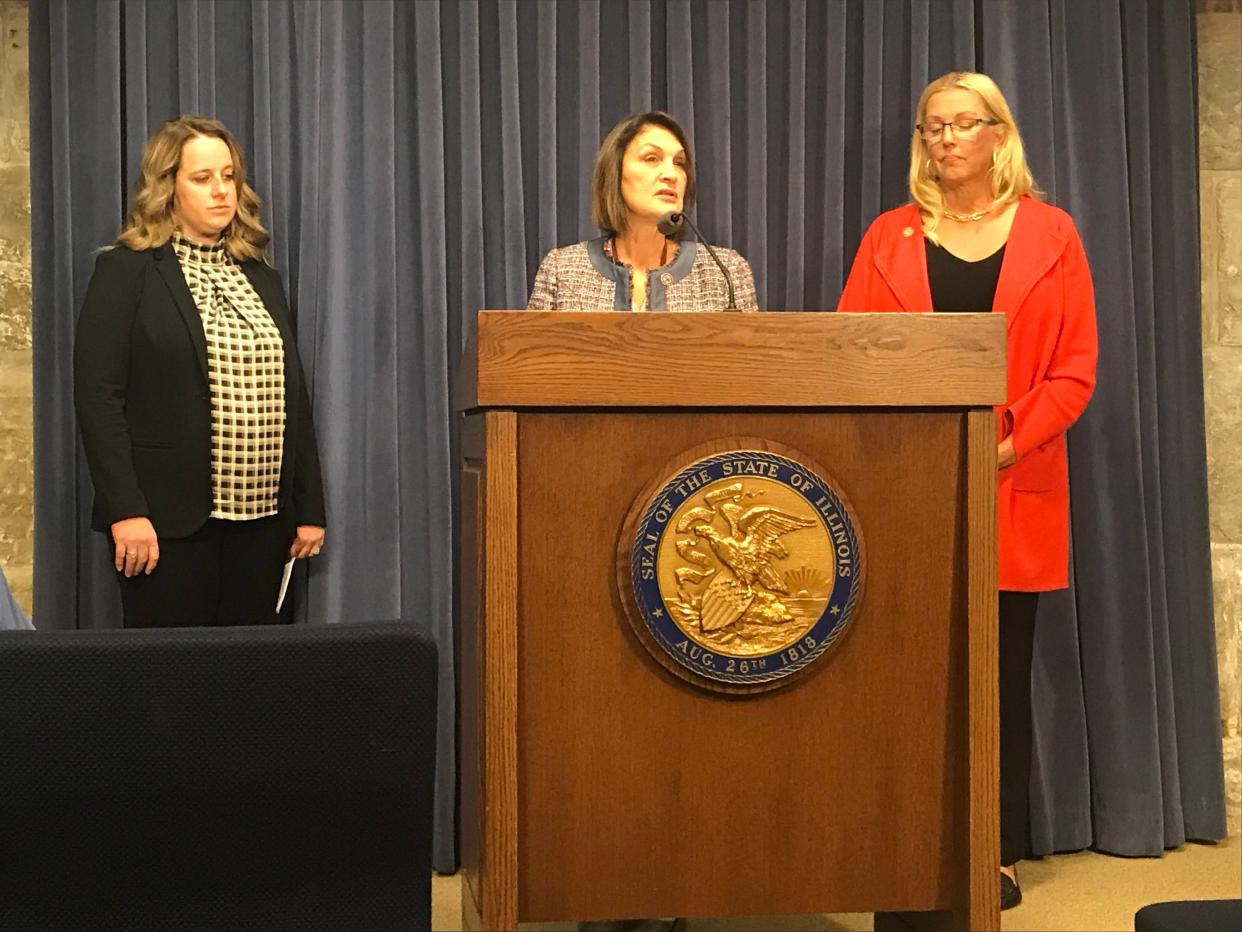Illinois Senate Republicans aim to stiffen penalties for dealers of fentanyl-laced opioids

With opioid-related overdoses rising nationally and in Illinois, two state legislators announced new legislation that would target dealers of fentanyl-laced opioids and other medications with increased penalties.
Republican state Sens. Sally Turner and Sue Rezin introduced Senate Bill 4221 during a Tuesday press conference at the Capitol. They hope the bill sees some action during the six-day veto session that started Tuesday.
Recent:Illinois General Assembly veto session begins. Here's what to know
According to the Illinois Department of Public Health, more than 2,650 Illinoisans died from synthetic opioid overdoses last year. That number is up from 87 in 2013. Rezin said not enough attention is being given to the issue.
"In less than a decade, the state of Illinois saw nearly a 3,000-percent increase in synthetic opioid overdose deaths," the Morris Republican deputy leader said, adding that last year's total was greater than the combined sum of homicides and suicides in the state.
Turner, who recently was re-elected in Illinois Senate District 44, noted the epidemic is being felt regardless of ZIP Code. In Sangamon County, where Turner represents much of the northeastern part, the county had a fatal overdose rate of 3.5 per 10,000 in 2021.
More Sally Turner:GOP Sen. Turner introduces election transparency bill
"If you haven't been personally touched by someone that has passed from fentanyl poisoning, I can guarantee you: you will," the Beason Republican said.
A large reason for the rise in deaths is the increased presence of fentanyl found in synthetic opioids. According to the Centers of Disease Control and Prevention, fentanyl is 50 times more powerful than heroin. An amount weighing no more than a penny could be lethal.
"We need to make it clear that if you conduct this kind of criminal activity in Illinois, there will be consequences," Rezin said.
The route to combatting this trend, the senators said, is to amend and expand existing offenses associated with the manufacture, delivery and trafficking of the controlled substances.
SB 4221 would amend the Illinois Controlled Substances Act by making the selling of any scheduled drug laced with a detectable amount of fentanyl a Class X felony — punishable by nine to 40 years in prison. Those that use electronic means of communication to sell these substances could face a Class 1 felony, which is punishable by four to 15 years in prison and a maximum fine of $100,000.
McLean County State's Attorney Erika Reynolds was supportive of these changes as current prosecution efforts are too limited in her opinion.
Current law requires more than 15 grams of fentanyl delivery for a defendant to be non-probationable, which Reynolds said limits her office's ability to seek justice.
Drug cartels are also marketing their product in a more child-friendly way, sometimes in the form of a candy-like pill.
"If so little amount can kill an average-sized male, imagine how little it would take to harm a child that thinks they are consuming candy?," Reynolds said.
Any chance of this legislation passing in the Illinois General Assembly would require support from Democrats, who hold supermajorities in both chambers.
Rezin said discussions will be had with the Democrats on the legislation with the aim of getting a larger package together. What makes passage more likely here, she said, is who the bill targets.
Related:In Illinois, the red wave hit a blue wall as Dems stay dominant and GOP looks for answers
"Now that the election is done, we can refocus on important policy issues and we plan on working with our colleagues across the aisle," she said. "The topic, we all agree, needs to be addressed ... their solutions may be different than ours."

A few hours after the press conference, Attorney General Kwame Raoul announced his office had reached a $3.1 billion settlement with Walmart. Walmart was facing allegations of improper oversight in how it sold opioids at its stores.
With approval of 43 states and local government units representing 85% of the population, the national settlement would go into effect immediately. It is believed the deal will have sufficient support by the end of the year.
“Too many families have lost loved ones to the opioid epidemic, and too many people have lost years of their lives to addiction,” Raoul said in a statement. “The companies that created and fueled this crisis must be held accountable for providing treatment and recovery resources to help those who suffer from opioid addiction.
Contact Patrick Keck: 312-549-9340, pkeck@gannett.com, twitter.com/@pkeckreporter
This article originally appeared on State Journal-Register: Increased penalties for opioid dealers the focus of new Illinois bill

